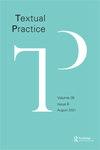替代头像的剽窃者,或者,一个尴尬的故障
IF 0.4
3区 文学
0 LITERATURE
引用次数: 0
摘要
剽窃和尴尬之间的关系是什么?哪些潜规则决定了我们对不当文学行为的反应?为了解决这些问题,本文以南非作家威廉·安克大量“借用”塞缪尔·贝克特的作品为背景,提出了三个可替代的角色——鲶鱼、黑客和皇帝——来取代马夏尔的典型剽窃者或奴隶形象。鲶鱼是一个骗子,一个以引诱为目标的身份的占有者和聚合者。黑客是一个数字强盗,他大胆的侵犯既令人钦佩又令人恐惧。而皇帝就是那个密码,要么穿上大家同意的外衣,要么以暴露自己为代价剥去。不管他们有什么缺点,这些人物都有一个优点,那就是把关于剽窃的讨论从权利和所有权转向身份、信任和曝光。奴隶倾向于把被冤枉的人和做错事的人围起来,而另一种形象则向读者敞开。他们要求我们思考我们在构成、宽恕或谴责文学欺骗行为中的角色,标记我们的道德判断和情感反应之间的联系,并最终反思我们在面对抄袭时作为伪君子的讲师的地位。本文章由计算机程序翻译,如有差异,请以英文原文为准。
Alternative avatars of the plagiarist, or, an embarrassment of glitches
What is the relation between plagiarism and embarrassment? What unspoken rules dictate our responses to improper literary behaviour? Addressing these questions against the backdrop of South African author Willem Anker’s substantial ‘borrowings’ from Samuel Beckett, this article proposes three alternative avatars – the catfish, hacker, and emperor – to displace Martial’s archetypal plagiarius or enslaver. The catfish is an impostor, an appropriator and aggregator of identities who aims to seduce. The hacker is a digital bandit whose daring encroachments are as much admired as feared. And the emperor is that cipher either clothed by common consent or stripped at the cost of our own exposure. Whatever their vices, these figures have the virtue of nudging discussion of plagiarism away from rights and ownership towards identity, trust and exposure. Where the enslaver tends to ringfence the wronged and the wrong-doer, the alternative avatars open towards the reader. They ask us to consider our role in constituting, condoning or condemning acts of literary deceit, to mark the connections between our moral judgements and our affective responses, and, ultimately, to reflect on our position as hypocrites lecteurs when confronted with plagiarism.
求助全文
通过发布文献求助,成功后即可免费获取论文全文。
去求助
来源期刊

TEXTUAL PRACTICE
LITERATURE-
CiteScore
0.70
自引率
0.00%
发文量
77
期刊介绍:
Since its launch in 1987, Textual Practice has been Britain"s principal international journal of radical literary studies, continually pressing theory into new engagements. Today, as customary relations among disciplines and media are questioned and transformed, Textual Practice works at the turning points of theory with politics, history and texts. It is intrigued by the processes through which hitherto marginal cultures of ethnicity and sexuality are becoming conceptually central, and by the consequences of these diverse disturbances for educational and cultural institutions.
 求助内容:
求助内容: 应助结果提醒方式:
应助结果提醒方式:


